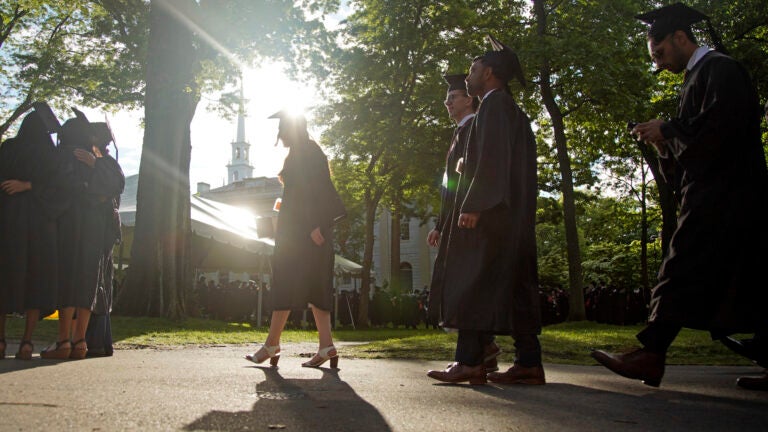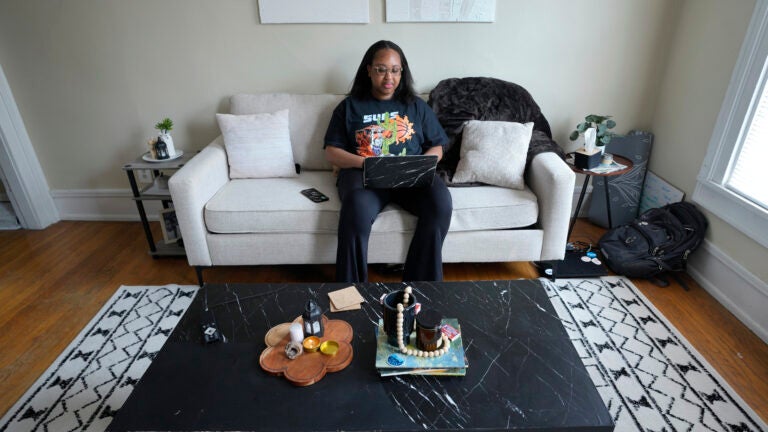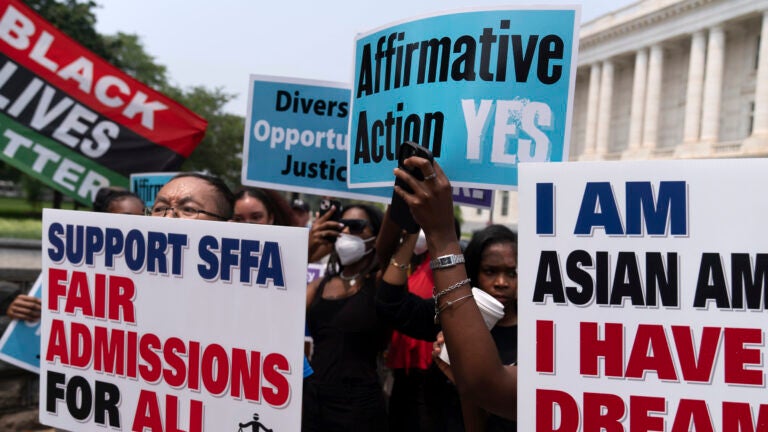Readers Say
A majority of readers polled agreed with SCOTUS, saying “the answer isn’t more discrimination.”

Graduates walk at a Harvard Commencement ceremony held for the classes of 2020 and 2021, May 29, 2022, in Cambridge, Mass.
Affirmative action is effectively over in the United States, and Boston.com readers say they approve of the change.

In a landmark 6-3 decision on Thursday, the Supreme Court restricted the use of race as a factor in college admissions, marking the end of a decades-long policy meant to diversify colleges and universities.
The justices, the same six members of the court who overturned Roe v. Wade last year, said race-based admissions policies at Harvard University and University of North Carolina violated the 14th Amendment’s equal protection clause. Chief Justice John Roberts wrote the majority opinion covering both disputes. “Many universities have for too long wrongly concluded that the touchstone of an individual’s identity is not challenges bested, skills built, or lessons learned, but the color of their skin,” he wrote.
Harvard, Northeastern, Governor Maura Healey’s administration, the state’s congressional delegation, and the Massachusetts Teachers Association all released statements following the ruling. “No part of what makes us who we are could ever be irrelevant,” Harvard’s president Lawrence Bacow wrote.
Do you agree with the Supreme Court ruling against affirmative action?
However, in a Boston.com poll, the majority (65%) of the more than 1,600 readers polled said they agreed with the court’s ruling. “Skin color is not a gauge for character, intelligence, work ethic, or talents,” Erin in Boston wrote. Maria M. in Lowell agreed. “Discrimination of any shape and color is unconstitutional,” she said.
It’s not just Boston.com readers, most Americans seem to side with SCOTUS too. According to an ABC News/Ipsos poll, 52% of Americans approved of the court’s decision restricting the use of race as a factor in college admissions.
The affirmative action ruling preceded two other decisions by the Supreme Court. On Friday, SCOTUS ruled in favor of a designer refusing work with same-sex couples. The court also struck down President Biden’s $400 billion plan to cancel or reduce federal student loans.
In the wake of last week’s ruling, Boston-based nonprofit Lawyers for Civil Rights brought forward a civil rights complaint over legacy admissions at Harvard on Monday. “Why are we rewarding children for privileges and advantages accrued by prior generations?” said Ivan Espinoza-Madrigal, the group’s executive director. The civil rights group alleges Harvard admissions discriminates against students of color.
Ahead, see a sampling of reader reactions following the court’s affirmative action ruling.
The Supreme Court ruled against affirmative action. Do you agree?
Some responses have been lightly edited for length and clarity.
Yes
“Economic disadvantage should be the factor as this will preserve diversity. Where ethnic minorities typically come from [economically] disadvantaged communities, there shouldn’t be a disruption in diversity in admissions.”
— Camilla W., Roxbury
To solve discrimination, the answer isn’t more discrimination. Any law written that doesn’t include everyone, is automatically unconstitutional, and will be challenged in court.
— Kenneth M., Barnstable
“Racism is wrong, even if done supposedly with honorable intentions. My children are Asian and they should have the same chance of getting into elite colleges as anyone else, without needing to lie about their race.”
— James, Jamaica Plain
“When you use race to make a decision it’s racist. Race isn’t your accomplishment or your character; it doesn’t indicate anything about hardship or your lived experience and it’s incredibly racist to [assume] anything about a person based on the way they look. A school can appear diverse based [on] color and still have no diversity because everyone has similar values, politics, age, beliefs and ideas. For example, I’m in school now, working full time, pregnant, commuting an hour each way and struggling hard. [T]he system isn’t set up for people like me but I’m committed and I’m hustling to make my life better. The rest of the people in my classes can afford to be in school full time; focus on only school. [I]t doesn’t matter what race they are, they mostly all have this privilege and there is no support for people who don’t have the luxury to commit full time to school as their only priority, but they claim to be so diverse and inclusive. Skin color isn’t diversity and basing diversity initiatives off race perpetuates stereotypes and racism.”
— Morgan, Revere
“The case before the Supreme Court and their ruling was simplistic. Colleges do not admit students solely based on their grades, their SAT scores and their expensive extracurricular activities. Even the most selective institutions recognize that many factors outside of these lead to successful students who contribute to the institution and society as a whole as a result of their admissions. These students are still chosen from a pool of qualified students …”
— Jane, Woburn
“Asians and others are being discriminated against. College entrance should primarily be about academic merit. Other factors should be considered for students of equal merit. Other factors should not include skin color, but can include social opportunities. Low-income students that have worked hard to achieve should be favored.”
— Ted G., Maynard
“Universities spend a lot of time patting themselves on their backs for their diversity efforts, but it’s diversity on their terms. As long as you’re part of their concept of a ‘model minority,’ you’re fine and they’ll accept you. I don’t see anything wrong with the Supreme Court forcing colleges and universities to cut back on their hubris a bit and be a little more open and honest with respect to their application processes as well as intentions, and perhaps realize that their supposedly morality regarding race as a consideration may be more self-idealization than an actual morality to uphold when it works for them but also uphold when it works against them. But that is the dilemma of our times: We love our morals when they work for us, but we’re quick to abandon them when they’re in our way. Universities such as Harvard are no less susceptible to this than the average person, even if it isn’t what they want to believe about themselves.”
— John, Jamaica Plain
“Affirmative Action was meant to be a temporary measure, to help establish a black middle class at a time when opportunities were limited due to systematic and overt racism. It was never designed to [last] beyond a generation or two. It was never supposed to allow under qualified students to attend elite colleges and universities. It was not meant to allow privileged black students whose educational attainments are lacking when compared to non-black peers to be admitted to elite colleges and universities. … The sort of affirmative action program we need is not one based on skin color, a colorblind program accounts for the lack of opportunities that top students who attend the lowest quality high schools have.”
— Anonymous, Somerville
“Affirmative action was always meant to be a temporary measure to overcome prior decades of discrimination, not a permanent crutch. An endpoint was always intended so why not now? Discrimination in all forms is inherently unfair.”
— John S., Lexington
“Because Section 1 of the 14th Amendment to the US Constitution says no person should be deprived of the equal protection of the law. Although the colleges in question may be doing what they think is right, it is an illegal attempt to discriminate on the basis of race.” — Hugo, Roxbury
“Discrimination, no matter how much allegedly well intended, is illegal under our laws. Treating everyone equally is the only answer. Harvard has a long history of discrimination, most recently with Asian applicants, and previously with Jews and immigrants. Harvard should try in do better.”
— R. Kelley, Beverly
No
“In the absence of reasonable opportunities and expectations for all, affirmative action, while far from perfect, is better than no action. Whatever nitpicking of legalese enabled the court to rule this way ignores, perhaps deliberately, the good that enabling those sectors of our society for whom all things are not equal achieves. Just look at Berkeley. When political bipartisanship leads the way of a Supreme Court, one is left questioning whether or not the so called justices are fit for purpose.”
— Margaret Hanson, Weymouth
“Because it is absolute nonsense to think that we live in a colorblind society and are so far removed from the days of slavery, Jim Crow and segregation. We are not. The effects of systemic racism and injustice continues to weigh down generations of families of color. Moreover, the advantages of one’s socioeconomic status and whether one is a ‘legacy’ continues to flourish.”
— Stephanie, Boston
“As a woman in her 70s, having entered a workforce predominantly of men, run by men, I understand the need to actively work for balance and fairness. Sometimes it may have seemed that women were taking jobs from men, but a start had to be made. Pushing back against systemic racism and misogyny is not easy. In a democracy it is essential. It’s how we balance the scales that have been out of balance for so long.”
— Jan C., Winter Springs, Fla. (formerly Bridgewater, Mass.)
“I feel it helped a lot of kids who otherwise would never had a chance to go to college. It makes me sad to see how determined this right wing court is to change established laws…”
— AR K., Brookline
People of color have been discriminated against for hundreds of years and still are in many places in this country. They should be given a chance to compete against the generational wealth and opportunities they have been maliciously denied.
— Glenn, Woburn
Legacy students are never touched in this conversation. This is also affirmation action program. Hopefully Black and Latino students will look at the HBCU’s – Howard, Spellman, Morehouse and many more. Black and Brown students go where you are appreciated, mentored and loved.
— Evelyn B., Roxbury
“As a white college graduate, having fellow students that come from different racial, social, ethnic, and economical backgrounds has provided me a very diverse range of perspectives which greatly enhanced my formal education. I’ve been humbled and have had my privilege checked. Humility is a virtue. My college experience has been an eye-opening positive experience for me and has made me a better person and more well rounded student. I don’t think that many people understand the educational set backs this creates for all college level students moving forward. By disallowing measures to increase/ensure diversification, this decision stymies the very purpose of higher education–teaching students to question and test their own beliefs. In addition, this move illustrates the hypocrisy of this current court–they think the federal court should override the expertise of educators. So much for smaller government.”
— Marc, Warwick
“The United States of America is what it is today because of diversity. The [Supreme Court] has taken that away from higher [education] by going back decades in history to what was once was. As a country everybody needs to be given equal opportunity to thrive but it doesn’t always work that way. In Boston, students were sent to affluent communities for better education (METCO). [W]hy is that? Everybody has a story to tell of where they are from and what their experiences have been, some people more so than others. Affirmative action has helped integrate America and this rouge court just took us back to the 60s.”
— Fola O., Billerica
“The Court has used the extremist views of its more recent additions to arbitrarily overturn decades of progress for disenfranchised groups without any credible justification. This is nothing more than partisan antics, and this case should have never made it so far within an impartial judiciary in the first place. Court reform is so badly needed, and adding seats to an already dysfunctional group of judges will not solve the problem. Alito and Thomas need to be permanently removed.”
— KCH, Cambridge
“With our country’s history of race discrimination affirmative action was put in place to “begin” to even the playing field. We are NOT there yet. This change is decades too early. Shameful.”
— Cindy O., Chatham
Boston.com occasionally interacts with readers by conducting informal polls and surveys. These results should be read as an unscientific gauge of readers’ opinion.
Boston.com Today
Sign up to receive the latest headlines in your inbox each morning.
![]()
Graduates walk at a Harvard Commencement ceremony held for the classes of 2020 and 2021, May 29, 2022, in Cambridge, Mass.
In Related News

>>> Read full article>>>
Copyright for syndicated content belongs to the linked Source : The Boston Globe – https://www.boston.com/community/readers-say/how-readers-feel-about-affirmative-action-ruling/









